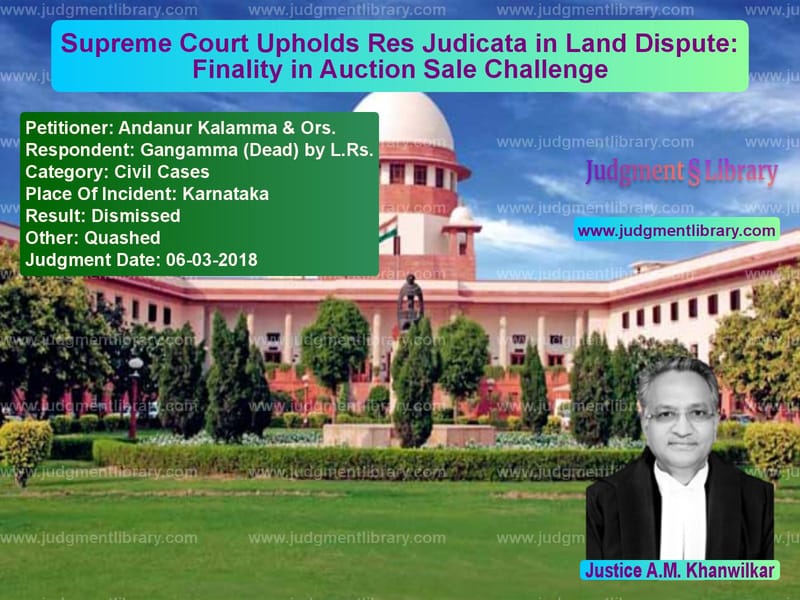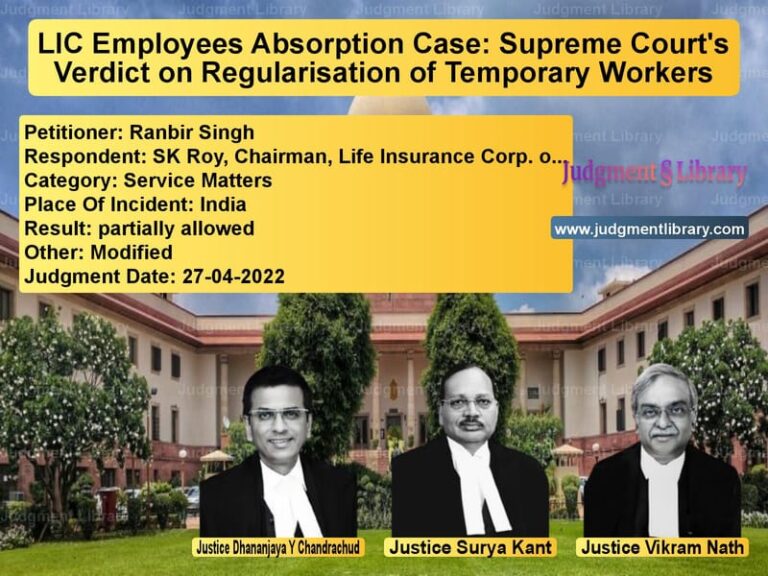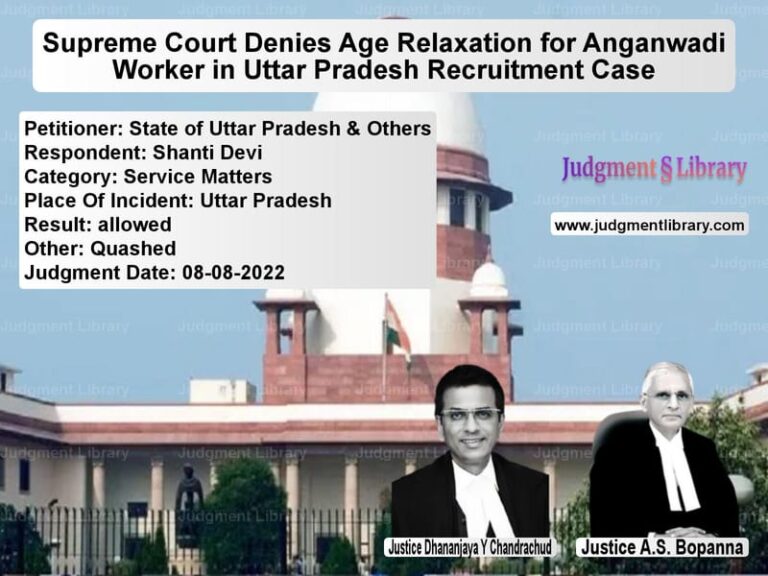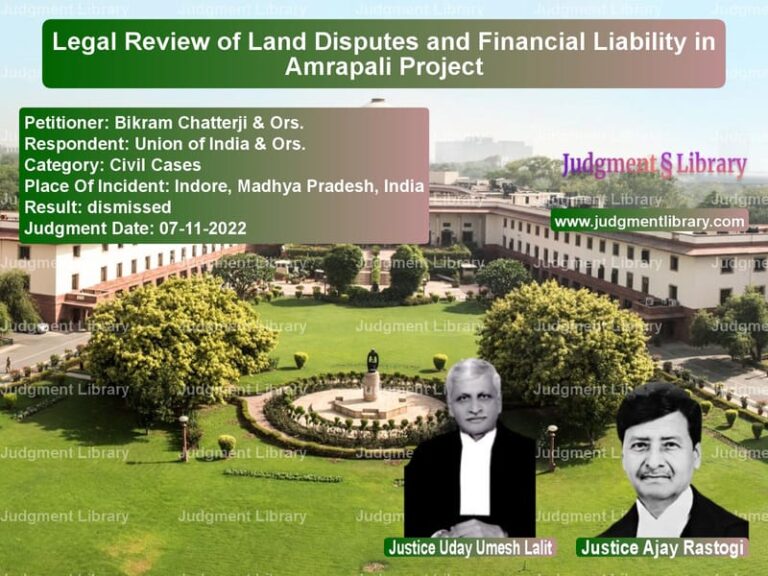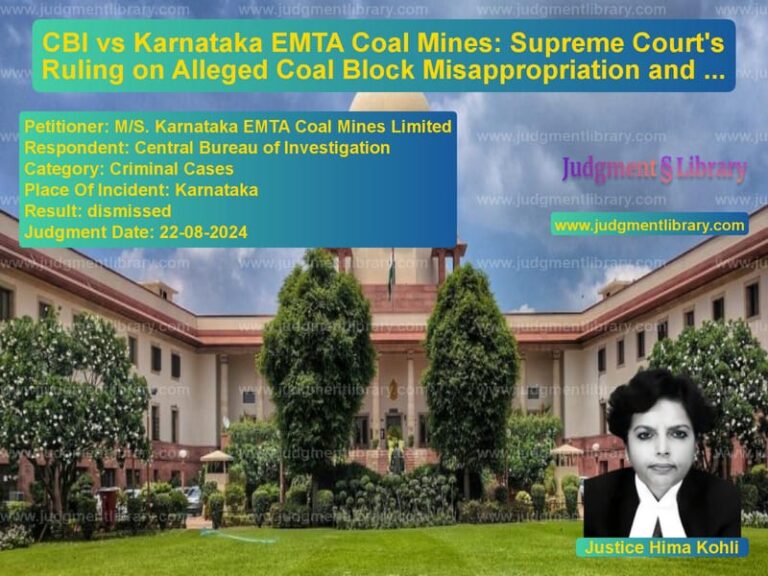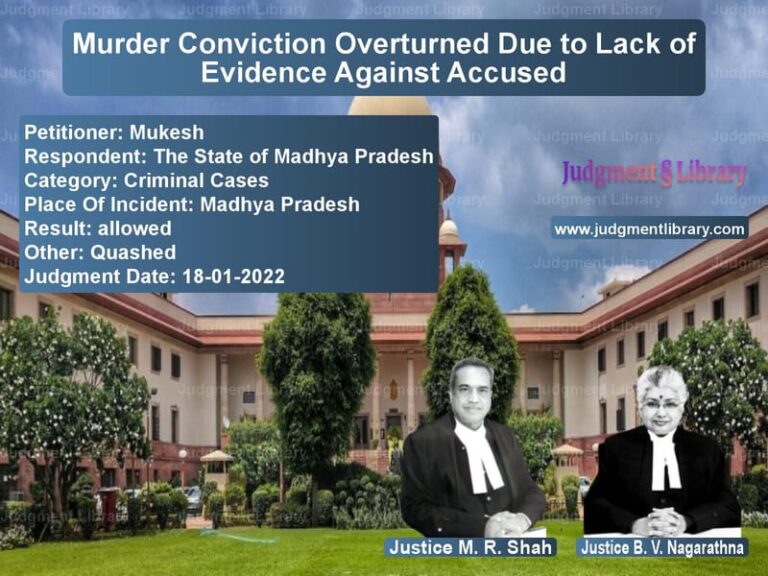Supreme Court Upholds Res Judicata in Land Dispute: Finality in Auction Sale Challenge
The case of Andanur Kalamma & Ors. v. Gangamma (Dead) by L.Rs. is a significant ruling by the Supreme Court concerning the applicability of res judicata in a long-standing land dispute. The appellants challenged the confirmation of an auction sale of land that was initially sold to recover tax dues. The Supreme Court upheld the Karnataka High Court’s decision, ruling that the case was barred by res judicata.
Background of the Case
The dispute arose over land measuring 23 acres and 15 guntas in Bisaleri Village, Davanagere Taluk. The father of the appellants, Andanur Umapathiyappa, defaulted on income tax payments amounting to Rs. 2,600. To recover these dues, the Income Tax Department referred the case to the Deputy Commissioner, Chitradurga, under Section 158 of the Karnataka Land Revenue Act, 1964. The land was auctioned on January 7, 1966, and the highest bidder was Belakerappa, father of the respondents.
The appellants contested the auction sale, filing an application on February 3, 1966 to set it aside. However, the Deputy Commissioner confirmed the sale on May 3, 1966, and issued a sale certificate in favor of Belakerappa. The appellants’ predecessor-in-title then pursued multiple legal avenues to challenge the confirmation of the sale.
Legal Proceedings Leading to Supreme Court
1. Appeal Before Mysore Revenue Appellate Tribunal
In 1967, the appellants’ predecessor filed an appeal before the Mysore Revenue Appellate Tribunal, arguing that the Deputy Commissioner had confirmed the sale without deciding their application to set it aside. On September 27, 1967, the Tribunal ruled in their favor and set aside the confirmation of the sale, remanding the case back to the Deputy Commissioner.
2. Rejection for Non-Prosecution
Upon remand, the Deputy Commissioner dismissed the appellants’ application for non-prosecution on June 8, 1969. A restoration application was also denied, prompting the appellants to appeal before the Tribunal again in 1971, but the appeal was rejected as time-barred.
3. High Court Writ Petition
The appellants then approached the Karnataka High Court in W.P. No. 1810/1971, which was dismissed on October 23, 1973. However, the court observed that if the sale had not been confirmed post-remand, the Deputy Commissioner could exercise suo motu power under Section 177 of the Karnataka Land Revenue Act if the appellants deposited the sale amount.
4. Writ Appeal Before Division Bench
The respondents challenged this observation in W.A. No. 152/1973. The Division Bench of the High Court ruled on January 7, 1975 that since there was no pending application to set aside the sale, the Deputy Commissioner’s discretionary power could not be dictated by the court.
5. Fresh Application for Suo Motu Power
Despite the High Court’s ruling, the appellants filed a fresh application on November 24, 1973, requesting the Deputy Commissioner to set aside the sale. This was rejected on June 9, 1975. A review petition was entertained, but the respondents challenged this in R.P. No. 304/1973 before the Karnataka Revenue Appellate Tribunal.
6. Second High Court Writ Petition
The High Court, in W.P. No. 14012/1981, set aside all orders favoring the appellants, reaffirming the finality of the auction sale. The writ appeal, W.A. No. 2176/1989, was dismissed on December 8, 1989.
7. Civil Suit Filed in 1990
The appellants then filed a civil suit (O.S. No. 27/1990), claiming ownership and seeking possession of the land. The trial court ruled against them, citing res judicata. The Karnataka High Court upheld the ruling in RFA No. 410/1998, which was later challenged in the Supreme Court.
Supreme Court’s Observations
1. Res Judicata Applies
The Supreme Court ruled that the case was barred by res judicata, as the same parties had litigated the issue multiple times before various forums.
“The identity of the parties, cause of action, and subject matter is identical in all previous proceedings. The claim has already been decided on merits.”
2. Auction Sale Confirmation is Final
The Court observed that the auction sale had attained finality with the High Court’s 1989 decision.
“The challenge to the confirmation of sale was rejected as early as 1975, and all subsequent proceedings were attempts to re-litigate settled matters.”
3. Civil Suit is an Abuse of Process
The Court held that the appellants’ filing of a civil suit in 1990 was an attempt to re-litigate the same issues.
“The appellants cannot re-agitate a matter already conclusively settled through multiple adjudications.”
Supreme Court’s Final Verdict
The Supreme Court dismissed the appeal and upheld the High Court’s ruling:
- The auction sale confirmation was final and binding.
- The suit filed by the appellants was barred by res judicata.
- The appellants’ attempt to challenge the respondents’ possession was legally untenable.
- The Supreme Court imposed costs on the appellants.
Key Takeaways
- The ruling affirms the doctrine of res judicata, preventing endless litigation on the same issue.
- The Court upheld the finality of auction sales in revenue recovery proceedings.
- High Courts and Tribunals must ensure that repeated challenges on settled matters are discouraged.
- The judgment reinforces judicial efficiency by preventing the misuse of legal processes.
Conclusion
The Supreme Court’s judgment in this case reinforces the principle that legal disputes must attain finality. The ruling prevents parties from repeatedly challenging settled matters, ensuring judicial resources are not wasted on redundant litigation. By upholding res judicata, the Court has set a precedent for preventing abuse of process in property disputes.
Petitioner Name: Andanur Kalamma & Ors.Respondent Name: Gangamma (Dead) by L.Rs.Judgment By: Justice A.M. KhanwilkarPlace Of Incident: KarnatakaJudgment Date: 06-03-2018
Don’t miss out on the full details! Download the complete judgment in PDF format below and gain valuable insights instantly!
Download Judgment: Andanur Kalamma & Or vs Gangamma (Dead) by L Supreme Court of India Judgment Dated 06-03-2018.pdf
Direct Downlaod Judgment: Direct downlaod this Judgment
See all petitions in Property Disputes
See all petitions in Succession and Wills
See all petitions in Specific Performance
See all petitions in Judgment by A M Khanwilkar
See all petitions in dismissed
See all petitions in Quashed
See all petitions in supreme court of India judgments March 2018
See all petitions in 2018 judgments
See all posts in Civil Cases Category
See all allowed petitions in Civil Cases Category
See all Dismissed petitions in Civil Cases Category
See all partially allowed petitions in Civil Cases Category

